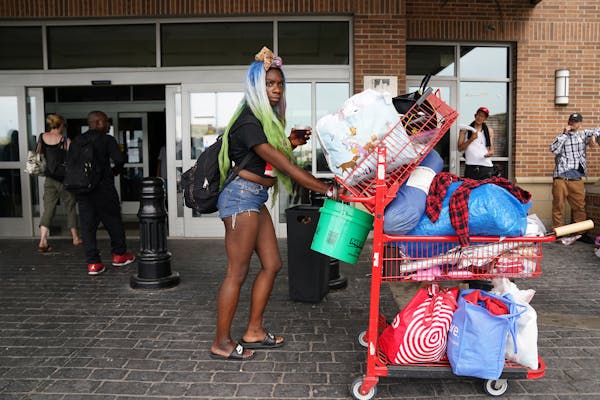Dozens of homeless men and women who sought refuge in a south Minneapolis hotel during the street protests following the death of George Floyd are still struggling to find a safe place to stay amid multiple eviction notices.
More than 200 homeless occupants of the former Sheraton Minneapolis Midtown Hotel, near Lake Street and Chicago Avenue, awoke to an unwelcome surprise Tuesday morning, when they were ordered to vacate their rooms at the hotel, which had been converted into a shelter for the homeless during the recent riots.
Lacking other options, many migrated with tents and bags to a shady hilltop overlooking the lake at Powderhorn Park in south Minneapolis. Seeking safety in numbers, about 30 people pitched tents at the northwest corner of the park, near 10th Avenue and E. 32nd Street.
On Friday morning, however, these tent dwellers got another surprise wake-up call. About 7 a.m., several officers with the Minneapolis Park and Recreation Board walked through the makeshift camp and gave everyone written notices saying the camp would be dismantled within 72 hours. "It was like a punch to the gut," said Dennis Barrow, who moved to the camp on Thursday after being evicted from the hotel. "We have nowhere left to go."
The back-to-back notices outraged humanitarian aid volunteers and nearby residents of the Powderhorn Park neighborhood, who poured into the park on Friday morning to show support for the tent dwellers. Many handed out water, food and medical supplies and denounced the Park Board's action during a hastily arranged media event near the tents. Some vowed to return to the site to prevent the homeless from being removed.
A standoff was ultimately avoided when the Park Board late Friday rescinded its 72-hour vacate notice and said tent dwellers would be allowed to remain while local officials worked on a solution.
"An eviction notice is not a solution," declared Grace Berke, community coordinator for the Powderhorn Park Neighborhood Association, which issued a statement denouncing the action. "These are our neighbors and we will not allow them to continue to be pushed further and further out where they can't be seen."
Many who arrived at the park this week looked exasperated after enduring weeks of stress and trauma. The former hotel where they had been staying was near the center of the riots, and many had moved into the building with the hope they would be offered stable housing. Instead, the hotel came to mirror the chaos in the streets nearby, with rampant drug use and fights in the hallways, residents said.
There was extensive destruction to the hotel in its final days, which occupants blamed on a handful of troublemakers. Doors were bashed in. Vending machines were dismantled. Flat-screen televisions were ripped from walls. Graffiti was sprayed in the stairwells. By Friday, the front lobby was in disarray, with garbage and broken furniture strewn about the entrance.
"A lot of angry people terrorized this property on purpose because they didn't like what happened to George Floyd and they stopped caring," said Michelle Smith, an organizer with Freedom from the Streets, who provided outreach to those at the hotel.
The hotel's owner, Jay Patel, declined to be interviewed Friday, as he gazed over his damaged property from the parking lot.
A few of the hotel's last residents looked worn and dispirited as they emerged from the damaged building with their few possessions. "This was a squandered opportunity," said Andre Stigger, a restaurant worker who has been homeless since losing his job in March. "This place could have raised people's consciousness. We could have shown the world that we're capable of lifting ourselves out of this situation."
Yet the mood was upbeat at Powderhorn Park, where dozens of volunteers and neighborhood residents worked through the day Friday to help the recent arrivals. Cheers swept through the group after they learned of the Park Board's decision to revoke the 72-hour vacate notice. The group had put out a call for provisions, including hot food, beverages and bug spray. A man with an injured knee was already getting treated in a makeshift medic tent.
On Friday, Park Board Superintendent Al Bangoura issued a statement saying he now recognized that 72 hours "is not enough time" to help people at the park find housing and other services. "Encampments represent a serious health and safety risk — particularly for those staying within the encampment — and do not represent a dignified form of shelter," he said. "I am committed to working with the community, local leaders and the [Minnesota] Interagency Council on Homelessness on a solution."
Still, it remains to be seen how quickly state and county officials can respond. Their resources and staffing have been stretched thin by a massive and unprecedented effort to move homeless people who are at particularly high risk for the coronavirus to area hotel rooms. To date, more than 600 homeless people have been moved to five area hotels.
Barrow was among those who pitched a tent under the trees at Powderhorn Park after a tumultuous week at the former Sheraton.
His eviction from the hotel marked the fourth time in two months he had been forced to vacate a site, and he was looking forward to a chance to connect with social workers. "I'm sick of that rock-bottom feeling, where you don't know where your next move is going to be," he said. "People here have really stepped up and made us feel welcome."
Chris Serres • 612-673-4308
Twitter: @chrisserres

Want to share info with the Star Tribune? How to do it securely

'Safe recovery sites' would offer syringes, naloxone and more to people using drugs. The plan could be in peril.
New Minnesota GOP leaders seek peace with party's anti-establishment wing

Who is Republican Lisa Demuth, Minnesota's first House speaker of color?

